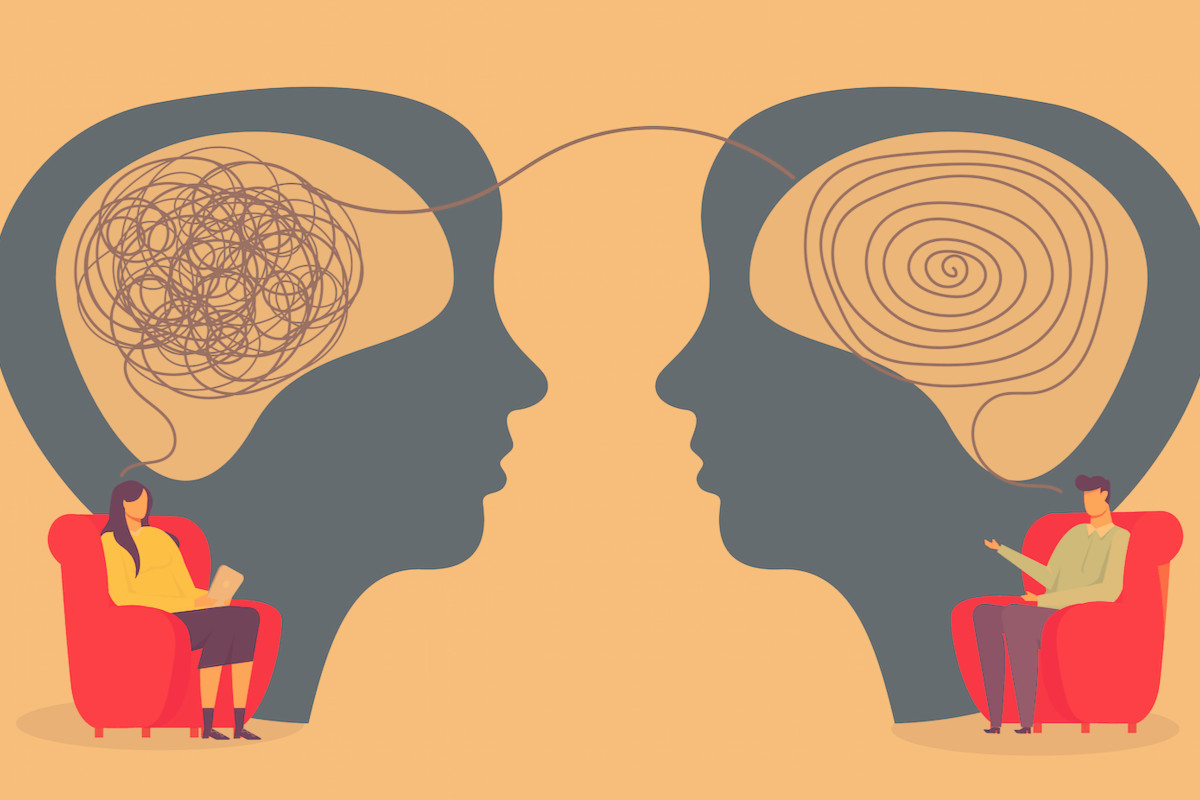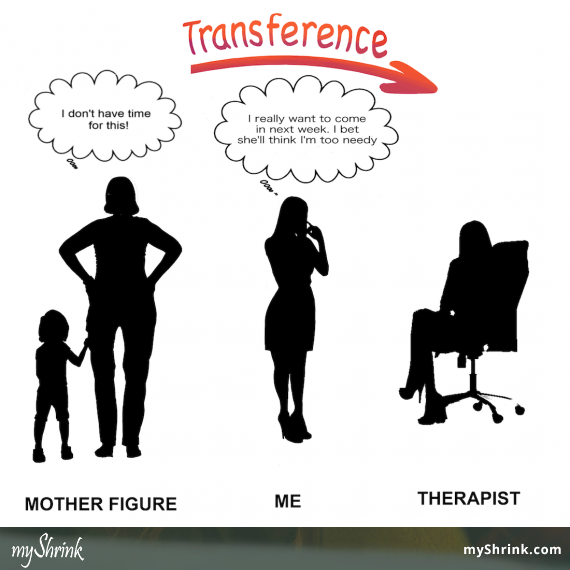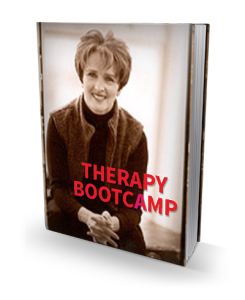


"I hate feeling dependent on my therapist"
Feeling dependent on your therapist makes you feel you're out of control with your life. Anyone who's gone through it will tell you, "transference is excruciatingly painful".
Have you noticed? Being so totally dependent on your therapist, it only takes the most innocent slight from your therapist to send you spiralling downwards.
Understanding how emotional developmental gaps direct your behavior today gives you some clues on how to move through your transference.
"The way we talk to our children becomes their inner voice."
Peggy O'Mara
Author

Dr. Susan LaCombe, Rebel Shrink & Psychologist
You're welcome to read this sample post from my online program called Therapy Bootcamp.
Therapy Bootcamp is a client's guide to transference.
By the time members get to this post, they've had lots of practice using the strategies/tools I mention. (The section describing how to get rid of feelings of dependency on your therapist is missing from this post.)
Feeling Dependent on Your Therapist Is Learned Early in Life

Let's take the silhouette illustration above as an example of how your early history might get played out as an adult.
As a toddler and young child this precocious little girl named Ginny learns that when she needs her mother (for comfort, hygiene, food etc.), it creates disturbances in their relationship.
Instantaneously, she senses it—not just on her mother's face—she feels it in the energy field between them.
In time, she recognizes that keeping these needs to herself keeps the connection to her mother clear (and avoids the negative tone and face of a stressed out, over-worked and possibly, an emotionally immature parent).
These experiences ill prepares her for life as an adult. Getting her needs met often takes a circuitous route (ie. she finds it hard to be direct).
Even basic needs - poses undue challenges in relationships especially if her needs conflicts with the needs of someone else.

Young ones are dependent on their caretakers and require a sustained and consistent care to thrive
In fact, Ginny is easily bruised emotionally and taken advantage of.
With little experience at getting her needs met and building emotional resiliency, Ginny becomes conflicted as an adult and it shows, especially as when engaging with perceived 'authority figures' (Strong unmet needs towards parents can often translate to feeling dependent on your therapist—another key authority in your life).
Your Body Reveals Dependency Needs Towards Others
Including Your Therapist
At this moment, Ginny thinks she might need more sessions. Even considering the possibility triggers a sense of foreboding. Suddenly she feels anxious and her body tenses, even though she has no idea why.
You see, her brain is being flooded with implicit memories from her childhood. Nothing particular pops into her mind - like all implicit memories, the source of the feelings are unconscious. The feelings, sensations and partial images feel familiar nevertheless.
Unaware that she’s just slipped into child mode (emotionally she’s a little girl tugging at her mother’s skirt), she interprets her angst as a sign that her needs are “unreasonable”.
Childhood experiences shape how we feel towards ourselves
In a knee-jerk response, she labels herself as being “too needy” and feels her mother’s negative reactions to her needs as a once-and-for-all-time judgement on her self worth.
Were she able to sense the transference for what it really is (the activation associated with unconscious sensory and emotional memories of her mother's disdain), she could actually use the transference experience to take a huge step in therapy.

Early unmet dependency needs towards parents is revealed in feeling dependent towards our therapist later in adulthood.
Unfortunately, this is very unlikely to occur with as long as she is still working solely within a "talk therapy" paradigm.
This is what appears to be happening in Diane's situation below.
Diane: "Help...I can't Quit."
I'm totally feeling dependent on my therapist

Diane, Livingston, USA
Help...I can't Quit.
I'm sure I'm experiencing transference and cannot stand it. I walk into the office all ready to talk about my feelings and as soon as I sit down I shut down and feel like I'm 10 years old. I hate her and love her at the same time and can't stand that I wasn't warned that this crap can happen. I blame her for not warning me about transference and really wish I had never met her at times.
I started out in marriage counseling which went well and it's 3 years later and I can't leave. I've tried--said goodbye--decided I was done, but something draws me back to her.
By the way I am a woman and I do not have sexual desires for my therapist when I say I love her, it's a love for this person that always listens and is always there for me. Reality is she's not tough. She can't answer the phone whenever I call and when I need to talk I can't. I hate that I have to wait for and appointment. It would also be sooooo much easier to discuss all of this with her on the phone and she won't do that.
I want to quit , but can't. I'm stuck. I hope you can help.
Diane, Livingston, USA

Shrinklady
Diane re-posted and added these comments.I thought I'd include them as she's posed some good questions.

Diane, Livingston, USA
After re-reading what I wrote, I thought I'd add a few more lines. Why does everything I say about her or my feelings have to relate to something else?
I feel like my feelings are not real because we are always looking for a reason for them and they are supposedly not really towards her but something else.
Why can't I just like and not like my therapist? Also, how am I suppossed to trust her when she doesn't open up to me? I know I would be more comfortable talking if she allowed me to trust her with something. I hate the one-sidedness of the whole thing. I have googled her and found out information, but that's not good enough. I actually became very angry by what I found.
Sometimes I really don't even know why I'm seeing her, but like I said, I'm drawn toward the whole thing. I go into the office or call her expecting one thing and leave or hang up disappointed. I have also talked to her about crying in the office. I have said that I won't cry because I'd feel foolish sitting there while she stares at me crying.
The other thing is now that I told her that how can I cry if I feel it coming on? I'll really feel like a fool after telling her I'm not going to. I'd feel like I was giving in.
As you can see there's alot going on and I'm really am stuck.
I've thought about trying a new therapist, but really don't want to start all over again.
Help Diane

Shrinklady
Hi Diane
I felt there was so much in your post that I asked my friend, Dr. Carole to add her thoughts to the topic.
What we were really struck with is your deep yearning for a felt connection with your therapist, which is so healthy. And, yes we do hear the agony that you are going through.
You can count on her being there when you arrive for your appointments. However, it seems like the felt connection is not sufficient.
What we wondered is if you were being attuned to?
It seems to us that your therapist is staying too far away which is keeping you feeling quite desperate and despairing . . . probably the same feelings you felt as an infant and the source of the transference.
She seems to reveal so little of herself. Without feeling her presence it must be incredibly scary for you. It likely feels as if you are hanging out there without the sure footing that a caring attuned mother would give her infant.
You need to feel that at some point she is joining with you…that she experiences your yearning for connection.
It's that feeling of being "tuned into" that provides the kind of emotional safety that helps us heal. She is holding firm boundaries but what seems to be absent is the processing of your relationship as you work together. In other words, she is not making the relationship between the two of you part of the therapy.
You mentioned how your therapist keeps referencing your feelings to "something else". In actual fact, any feeling we have can link up with our past. That goes for any one of us, for any feeling. That's just the way we're wired.
However, while these past-present hook-ups need to be made and it sounds like you're getting a sense of how your past is playing a role in the dynamic, what seems to be missing is looking at what's happening between the two of you in the present moment. It's a tricky balance.
You need to know that your therapist is tough enough to handle what you throw at her but also that she is being impacted by you to some degree. You need to feel her humanness. She needs to match your energy so you can bounce up against something.
It kinda reminds me of what a parent might do when a teenager is acting out—meeting their energy with firm boundaries and love.
We were also struck by your struggle with crying while your therapist looks on. Both Dr. Carole and I have had clients express a similar "push-pull" with tears. How a therapist responds can potentially support a healing moment.
However, if the bid for connection goes unmet, it can quickly turn into another, "once again I'm alone in my tears". When Dr. Carole has a sense that her client may be feeling stared at, it is through her attunement that she senses what's most appropriate.
For example, some clients will say they don't want to cry while agonizing through spilled tears. In some cases, the depth of a client's tears are such that she will ask if it's okay to sit beside her. Dr. Carole finds that this helps her client move through the emotion more easily. Because, after all tears are a natural way of expressing deep emotion. We want to honour them, not tuck them away.
We feel that your desire to have your therapist "trust you with something" comes from a healthy part of you. You see, as we feel trustworthy, our sense of trust in ourselves expands, and with that, so does life. We've done our best to address the dynamics described in your post. It's never possible however to objectively know from the outside the nuances inside a therapeutic relationship.
Our wish is that we have been helpful and that our musings will assist you in deepening your relationship with your therapist.
All the best on your journey,
Shrinklady and Dr. Carole
Personal Musings
Like many others experiencing transference, Diane is being encouraged to expose her vulnerabilities in a therapeutic setting that lacks emotional containment. This setup is often thought to facilitate healing by heightening emotional discomfort.
In reality, this scenario likely replicates the very conditions she faced in childhood, which prevented her from reaching crucial developmental milestones. The absence of attuned care during her formative years has contributed to the development of her transference in adulthood.
I strongly believe that this kind of therapeutic approach is unnecessary for healing transference and only serves to create undue distress for Diane.
At this critical juncture, Diane’s emotions are raw and unprocessed. She needs the right tools and knowledge to address the unresolved issues from her past. However, without the appropriate support and guidance, it's unlikely that she will be able to achieve this on her own.
New! Rate this article (anonymously)
Was this article helpful to you? Let others know.
Thanks in advance for your feedback
Dr. Susan LaCombe, Rebel Shrink
Therapy Bootcamp's Approach to
Feeling Over-Dependent on Your Therapist
(available inside Therapy Bootcamp)
Wondering what Therapy Bootcamp is all about?
Transference can be overcome. However, it can't be achieved through simply "thinking differently" or by gaining a deeper intellectual understanding of transference. It requires a completely different approach—one that is experiential and closely resembles good therapy.
In Therapy Bootcamp, you’ll not only learn what's required but also be encouraged to use transference exercises to achieve your goal of becoming transference-free. You’ll identify the exact experiences needed to complete an emotional developmental task, which is at the heart of transference. This task, in Diane's situation, relates to the universal childhood experience of being dependent upon a parent and the budding autonomy issues that emerge with that.
As long as the task remains unfinished, transference continues as a means of attempting to complete it. The Therapy Bootcamp approach is balanced with cutting-edge knowledge on how to best facilitate brain change.
The goal is to move beyond being in love with your therapist. While you may still be fond of your therapist, the obsession will diminish.
Your first task is to develop skills using tools that manage different emotional states, helping you shift out of negative emotions. For example, this would help someone like Diane feel safe enough to express her emotions with her therapist.
Once you've developed these skills, the next step is to mine your emotions for key information about emotional beliefs and unmet needs from your childhood experiences. The tools provided will help you navigate these emotions more comfortably.
Finally, you’ll create and provide yourself with corrective emotional experiences that complete your transference. The program includes specific ideas and methods for achieving this.
Understanding the conditions under which the brain learns best is also crucial, and this information will be a part of your learning journey in Therapy Bootcamp.
External Resource
Bodynamics and development stages (probably the best explanation of the issues related to transference than any other theory) Note that Therapy Bootcamp is based in part on this theory.

Dr. Susan LaCombe Psychotherapist and Psychologist
* Stay on track and AVOID going in circles in your therapy.
* Be LESS anxious in your sessions & have an easier time talking about the things that are hard to share.
*Address feelings of dependency towards your therapist with specific healing scenarios
* And finally, discover how to re-direct strong transference feelings towards your therapist into a POSITIVE therapy experience AND becoming transference-free.
"I had my session with my T. before she goes on vacation...So here I am the next day after my session and I feel mostly fine. No heartache or longing. Old me would still be in tears and not know why...This is HUGE progress for me." Samantha
